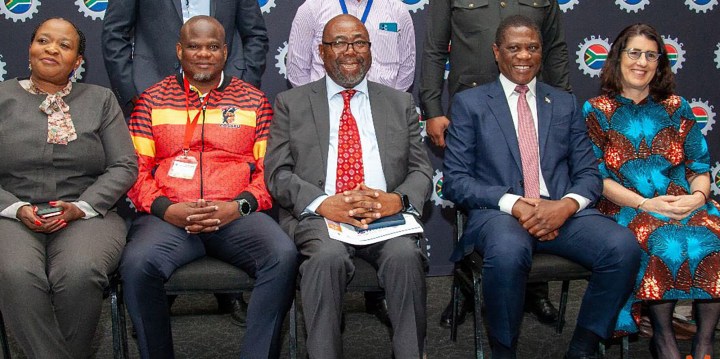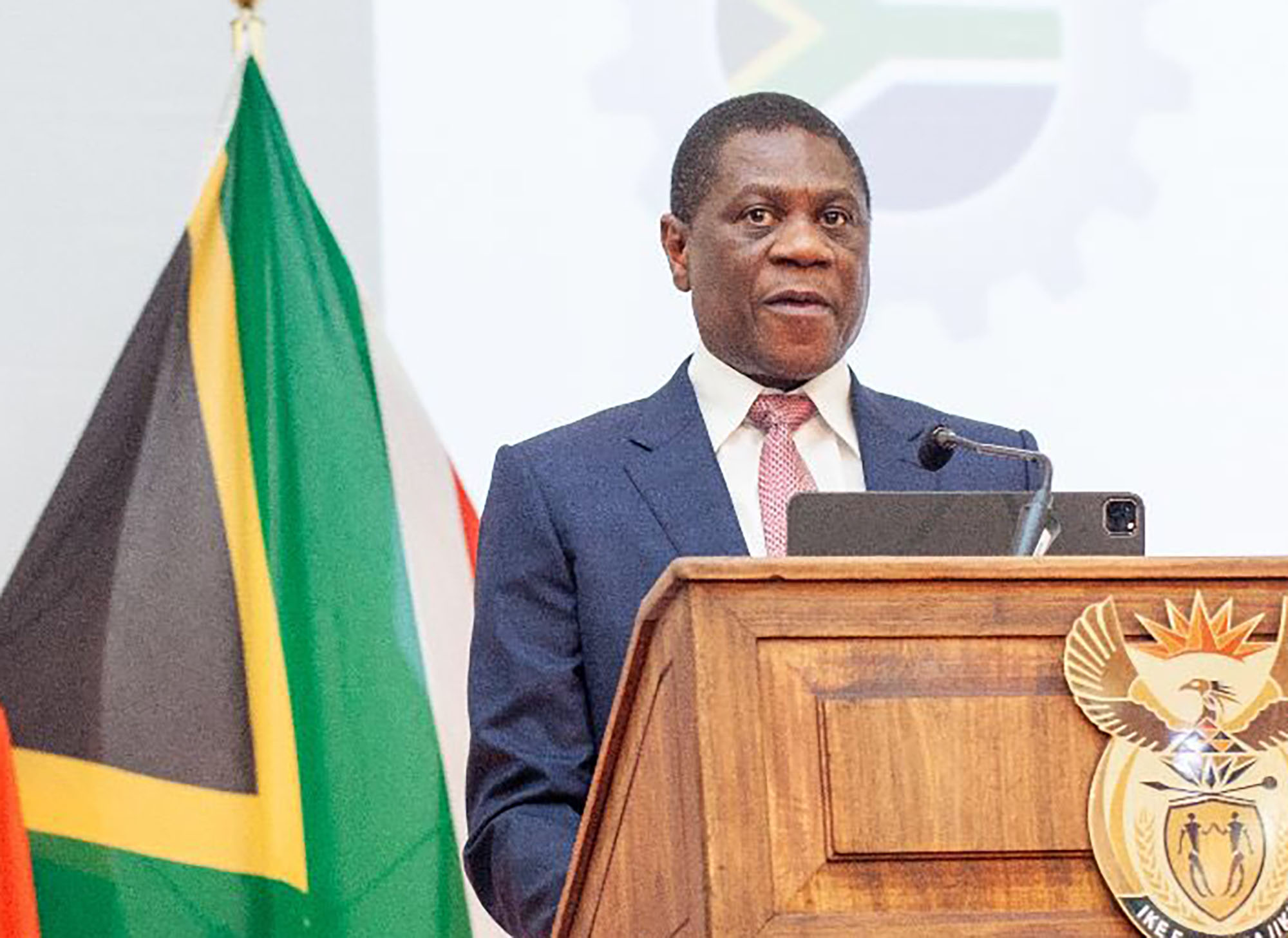DISASTER ALERT
South Africa is facing a polycrisis, Nedlac executive director Lisa Seftel tells summit

South Africa needs a better disaster response to be more resilient, as recent events such as Covid-19, flooding and ailing inner city infrastructure have demonstrated, the Nedlac Summit heard.
Opening the 28th annual Nedlac Summit on Friday, 8 September in Midrand, Minister of Employment and Labour Thulas Nxesi said Nedlac’s annual report reflected a job well done, especially because the organisation had received an unqualified audit.
Nxesi stressed, however, that it had to continue to improve its performance. “Unfortunately, there is one area of work in Nedlac where progress is just too slow and that is the area of labour market reform.”
Proposals to address conditions and inefficiencies in the labour market were Tabled in 2021. Nxesi said he had hoped it would have taken no longer than six to eight months [to implement them], but the process was still ongoing and would also not meet the deadline for the current parliamentary cycle.
Nxesi highlighted that improving the labour courts and collective bargaining functions were key areas of focus as well as the need to include the protection of the rights of workers in “non-standard” working conditions such as the “gig economy”. He said the backlog faced by the labour courts as a result of not having enough judges compromised workers and needed to be addressed.
On recent disasters, Nxesi told the summit that “just two months ago, we all watched in horror as a part of Bree (now Lilian Ngoyi) Street in Johannesburg collapsed and the inner city was left without services for many days as different parts of government sought to work out the cause and the most appropriate response.
“Whether these events are natural, man-made or climate-induced, which at some point was man-made, we have to accept them as part of our new normal. We need to plan better and be more prepared.”
The theme of the summit was “Resilience in the face of adversity: Social partners’ preparedness for crises”.
It was announced that the South African Federation of Trade Unions (Saftu), led by Zwelinzima Vavi, was now a member of Nedlac.

Deputy President Paul Mashatile gives the keynote address at the 28th Nedlac Summit. (Photo: NEDLAC)
Deputy President Paul Mashatile told the summit in his keynote address that “the current condition of the labour market is indicative of the abiding legacy of our apartheid past which presents a significant challenge today. We have inherited a labour force characterised by racial and gender inequities, skills shortages and high unemployment rates, particularly among Africans.”
Mashatile said that Covid-19 had further exacerbated economic setbacks, resulting in a loss of jobs and income. He noted, however, that unemployment had marginally decreased in the second quarter by 0.3%, putting it now at 32.6%.
On the climate crisis, Mashatile said that “we are facing a changing world where the impact of climate change is increasingly felt by all of us, whether it is the possibility of flooding in KZN or persistent drought in the Eastern Cape, whether it is high temperatures in Upington making it impossible to cultivate fields, or poor air quality in Mpumalanga, climate change is here.
“The government’s response has been to prepare for a just transition from the world as we know it, to one which is friendlier to the environment and ultimately gives our children a safe future.”
Mashatile emphasised that social partners should focus on preparing and building resilience to be able to respond to health crises, natural disasters, deteriorating infrastructure, rising levels of disruptive crime and vandalism, and the scarcity of water, particularly in rural areas.
Gift of the Givers founder Dr Imtiaz Sooliman made virtual inputs at the summit and criticised the government’s response in disaster situations. He said two departments were charged with disaster response, but that there was no clear leader and no one willing to take ultimate responsibility.
Sooliman said a clear chain of command needed to be established for a swift and effective response from each province and that it was not practical to have to seek disaster capacity from other provinces. “There needs to be a hierarchy, mechanism and an urgent release of the mechanism during crisis.
“People die when there is no system. We are a nation of resilient people, but we need a system of response.”
South Africa’s disaster personnel were world class, but they needed to be supported and resourced, said Sooliman.
A polycrisis

Executive director of Nedlac Lisa Seftel discusses the findings of Nedlac’s annual report. (Photo: Nedlac)
Executive director of Nedlac Lisa Seftel set the scene for the findings of Nedlac’s annual report by saying that South Africa’s GDP has gone down; only half of women who are of working age are working; the country is no longer an attractive investment destination; high inflation continues to disproportionately affect the poorest people; rolling blackouts continue to dampen growth and investment; and climate change is increasingly evident.
“Let us confront the fact that we have a polycrisis which requires a polycrisis response. As South Africans, as Nedlac and social partners, we are called upon to respond. Systemically and proactively in the long run, that’s where we need to continue to have visions of spatial integration, employment, quality education and respond reactively to the climate crisis, logistics and inflation,” said Seftel.
Included in the report was that Nedlac had now set up a Cost of Living Rapid Response Team which would look at the impact of energy on food production, improve food distribution and donations, and proposals to minimise the costs of staple foods.
Seftel said South Africa was in the middle of an existential crisis: “We do not agree on the systemic long-term programme to turn the economy around. We do not have the same economic view for the future and that makes it difficult to have the big trade-off. But because we are in a polycrisis, that shouldn’t stop us from continuing to build understanding and trust, responding to key issues, representing the best interests of your constituencies, especially in the context of adversity.”
Representing the business chamber in Nedlac, Cas Coovadia told the summit that the crises under discussion should not be happening in a normal society. “How can we continue with the same mode of engagement when things are falling apart? Although Nedlac may not have all the answers, it is the perfect platform for all social partners to raise and address these tough questions.”
Coovadia stressed that Nedlac needed to be fit for purpose for the challenges of the upcoming decade – on public policy matters, the organisation needed to reach as much agreement as possible with stakeholders, but didn’t need to always reach consensus and that “it must be a forum for social dialogue and focus on programmes on which there is the greatest scope for collaboration across stakeholders, instead of being a conflictual platform”.
Unemployment
Gerald Twala, convenor of organised labour at Nedlac, said that “the fundamental mandate at all times is resolving the ticking time bomb of unemployment; we cannot be proud as a nation when we remain the most unequal country in the world. No society can sustain itself when four out of 10 citizens, six out of 10 youth cannot find a job,” he said.
“Organised labour is proud of the relentless efforts and synergy of minds we showed as the Nedlac community during the pandemic to ensure that we released over R64-billion from the Unemployment Insurance Fund to help 5.7 million workers care for their families, and the mass roll-out of the vaccination campaign that reached over 60% of society, in particular the most vulnerable.”
Twala said that over the past year, they had been working with government to expedite key legislation and that they would be monitoring with keen interest progress on the NHI, Expropriation Bill, Mine Health and Safety Bill, Public Procurement Bill, Companies Amendment Bill, and the Employment Services Amendment Bill regulating migrant workers’ employment. DM



















 Become an Insider
Become an Insider
Rhubarb, rhubarb rah rah fishpaste. NEDLAC and the unions are irrelevant, they have no solutions or answers, they fact Mashatile trots out the old apartheid excuse shows they have no merit and are denying they themselves have destroyed the country